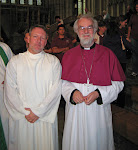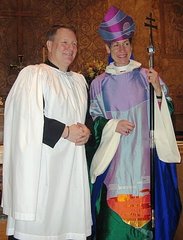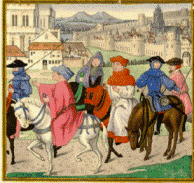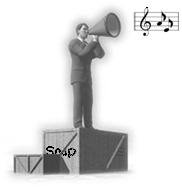Preached on Sunday, April 15th, 2007 at St. James Fordham Manor, The Bronx, NY:
http://stjamesf.dioceseny.org/
Lectionary readings this sermon is based on can be found at: http://www.io.com/~kellywp/YearC/Easter/CEaster2.html
I’m not really sure if I believe in nature or nurture. Are we born the way we are? Or are we who we are based on how we were brought up, who raised us and what has happened to us in our lives? If you were to see me at Thanksgiving, you’d have no trouble knowing who my people were around the table. I could be nobody else but my father’s son, and I might easily pass for my brother. I came home for Thanksgiving one year and when my grandmother saw me, the first thing she said was, “Well, now. You sure look like your brother now that you’ve fatted up some!” My father and brother and me, and in fact all my uncles and cousins really ‘favor’ each other, as we say down South.
Yes, my brother and I are unmistakably brothers. We look alike and talk alike to a degree. We have similar senses of humor and love to tease each other. But in many respects we are almost exactly opposite. He’s a rock-ribbed Republican and I’m a yellow-dog Democrat. My brother is a major in the National Guard and an accountant. I majored in English in college, and am now pursuing a career in the church. He’s way, way country and I am, of course, a sophisticated New Yorker! We had the same parents and grew up in the same home and yet we’re pretty different in some respects while we’re very similar in others.
Thomas in our reading today is an interesting fellow. He’s barely mentioned in the other gospels, but in John he has a bit more of a ‘speaking part.’ In chapter 11, Jesus is set upon traveling back to Judea to comfort the family of his dead friend Lazarus. The disciples warn him against going. Jesus has stirred up the ire of the religious authorities in Judea and there will undoubtedly be trouble if he returns. But go he will, and it is Thomas who says to the other disciples: “Let us also go, that we may die with him.” I’m sure that Thomas was just as afraid of trouble as the rest of them, but he was nonetheless willing to go with Jesus wherever Jesus might go, and he was willing to accept the consequences of following Jesus, whatever they might be.
These particular words of Thomas’s are set in stone in the floor of the narthex of St. Thomas’s Church on Fifth Avenue in Manhattan. The narthex at St. Thomas’s was redone as a thank offering for peace at the end of World War II. You’ll also find there the words from Luke’s Gospel: Peace on Earth, Good Will towards Men, and these are surrounded by the symbols of all the countries that were part of the Allied Forces in World War II. Nearby is an altar that lists the names of all the parishioners from St. Thomas who served and died in World War II and, my friends, let me tell you, there are very many names there. It seems the parishioners at St. Thomas heeded the words of their patron and went forth to die with each other and their brothers and sisters in arms in the worldwide battle against fascism. Like the apostles in our reading from Acts, they were steadfast and fearless in the pursuit of their duty.
Thomas has another ‘speaking part’ in John’s account of the Last Supper. Jesus is speaking rather cryptically about going ahead of the disciples where they cannot follow him, to prepare a place for them, and that they will know the way to that place when the time comes… Pretty confusing stuff, so Thomas asks Jesus, “Lord, we do not know where you are going. How can we know the way?” It is in reply to this question that Jesus makes one of his more famous statements when he tells Thomas and the other disciples, “I am the way, and the truth, and the light.”
As we can see, Thomas is a follower of Jesus in the truest sense. He wants to know where Jesus is going, and he is willing to follow him even unto death. How shocked and saddened Thomas must have been by the events of Good Friday. Willing to follow Jesus into any confrontation and to fight any battle, he finds that he has lost Jesus, not to a heroic death on the ramparts of Jerusalem fighting against the pagan Roman occupiers, or in an act of violent cleansing of the Temple of all its impure practices and hypocritical priests… but rather he has lost Jesus to the most ignominious of deaths, a death on a cross, stripped naked and exposed to die by the roadside into town, crucified along with two thieves, two common criminals, put to death like a common criminal himself. Not a glorious hero’s death, nor a brave rebel’s death, but a pitiful, shameful, criminal’s execution.
So, when we finally meet Thomas in today’s Gospel, he has lost both his hero, and his dream. He seems quite a bitter man. He hasn’t experienced Easter yet at all, he is mired in the darkness of Good Friday. He wasn’t with Mary, Peter, and John, and hasn’t seen and heard all that they did at the tomb on Easter morning. He wasn’t there on Easter evening when Jesus appeared to the disciples, miraculously entering a locked room and baring his wounds and breathing upon them, bathing them in a new form of God: the breath that is the Holy Spirit. No, when we finally find Thomas in today’s gospel, it’s a week or more after Easter and Thomas is still deep in mourning and bitter, and full of doubt about all that the disciples are telling him. Thomas is a man whose dream is dead, and he can’t believe, he won’t believe, that that dream can and will be reborn.
It is on the first Sunday after Easter, like this first Sunday after Easter, when Thomas joins the disciples in that locked room, and Christ appears to them again. When they are gathered together, just like we are here, Christ comes among them. And he offers his peace to them, and to Thomas he offers the very thing that Thomas has said he needs. He offers his wounds to probe, to serve as proof positive that he has indeed risen from the dead.
Thomas’s doubts fall away, along with all the bitter disappointment of the past week, and he worships the risen Jesus, proclaiming, “My Lord and My God.”
Paul Nancarrow, the canon theologian for the Diocese of Minneapolis has this to say about this incredible moment:
“Now that Thomas can experience the Risen One for himself, he becomes the first of the disciples to worship Jesus as his God. Thus the story of Resurrection, begun when the stone is removed from the tomb, is not complete until it is echoed and reechoed in the lives of believers. What the Thomas episode makes clear is that “belief,” in the particular sense John uses it in this gospel, is not simple credulity, nor is it accepting something as true, against all appearances, just because some authority declares it to be true. “Belief” in John’s sense always includes some element of experience, some direct encounter with the One in whom the believer believes. For post-Thomas Christians, our encounter with the Risen One comes in and through the community of disciples who carry on Jesus’ ministry in Jesus’ name and by Jesus’ Spirit, rather than by the sight of the eyes and the touch of the hand. Yet our encounter with the Risen One is no less genuine for having been mediated through the believing community—as indeed Thomas’s encounter was mediated—and the blessing we receive in believing is no less than the Peace conferred upon the disciples by Jesus on Easter evening.”
So, here we are, a week after Easter, just like Thomas. And we are drawn together in a community of believers, just like Thomas. And in a few moments, we will share in a meal that was first shared with Thomas and the other disciples at the Last Supper. And in that meal, the risen Christ himself will come to us, in bread and wine, in body and in blood. And by partaking of this mysterious, magical, momentous meal together we will become the body of Christ. As we partake of the body of Christ, we will become the resurrected body of Christ in this world. We are the community of disciples who carry on Jesus’ ministry in Jesus’ name and by Jesus’ Spirit. The Easter story is made real in us.
We are the risen Christ in the world now, and let me assure you, there are many Thomases in the world, now as then. There are those who are bitter, and those whose dreams have died, those who lives are filled with skepticism and disbelief. We see them all the time, don’t we? The sort of crazed looking fellows who seem to derive a small sense of power by walking into traffic and yelling back at the cars that honk at them. Those friends of ours at work who scoff at us when the subject of religion comes up. Those kids on the street who seem so young and yet are so determined to be as tough, and bitter, and menacing as they can. It’s uncomfortable to be around these folks or to meet them face to face. It’s easier to ignore them and hope they’ll go away, without causing us any trouble. It’s easy to turn our backs on those who have lost their way in the world, who seem to have turned their backs on us, those who are filled with disappointment and disillusionment and seem so committed to darkness and violence… Those who don’t want to believe as we believe, and think we’re fools to believe as we do.
But we have to remember that Christ didn’t turn his back on Thomas, or condemn him. Christ came to Thomas and offered him a reason to believe. Do we do that, I wonder? Can we do that in this day and age? Can we, like Christ, offer the Thomases of our world the experience of a risen Christ? Can we show the world both our woundedness and our healing? Can we bear witness to the little deaths that we have experienced, and the resurrections we have been blessed with? As today’s collect puts it, can we who have been reborn into the fellowship of Christ’s Body show forth in our lives what we profess by our faith? Do we have any hope to offer the disappointed? Any sweet consolation for those who have drunk of nothing but bitter gall?
The answer is yes. We can be agents of the risen Christ in the world by not turning our backs on those who most need us: the doubtful and the bitter and the disappointed. Perhaps a word of forgiveness instead of recrimination when we are wronged. A welcome to the stranger. Acceptance instead of condemnation. A word of concern and guidance to the youth who seems so troubled. Or maybe just a wide enough berth for those who walk the streets of our city filled with rage. But most of all, because we have come to believe like Thomas did, we can continue to believe in the Thomases in our world who feel as if they have nothing left to believe in. Christ did not stop believing in Thomas, neither should we. Christ offered Thomas the experience of the resurrection that he had missed. We can do the same. Our experience of resurrection, as professed every day in our lives and practiced each Sunday on this altar has an effect; it has an impact on the world, on those we love, and on us. Its Easter Day every day for us, because like Thomas we have had and continue to have a lived experience of Jesus Christ, once dead, now risen to new life in each of our lives; a fact we will soon reenact and reiterate in the breaking of bread and the blessing of wine.
There’s a tradition in the Church that Thomas became the apostle to India, and helped found the very ancient Christian Church there. Thomas proved to be a loyal and constant follower of Jesus after all. And after his experience of the resurrection, if legend is true, he became a leader that others then followed. Maybe he was born that way, maybe it was the experience of the risen Lord that made him that way, maybe both. Nature or nurture -- I don’t think there’s really much difference. We were made by God to love, and we love God in return. We were born and then reborn in the waters of baptism. We all will die, but will rise again on the last day, in the resurrection of the world. We are Easter people. It is both what we have become, and what we were born to be. It is what we have to offer to the world.
19 April 2007
Sermon for Year C, Easter 2: "Nature or Nurture"
Subscribe to:
Post Comments (Atom)







No comments:
Post a Comment